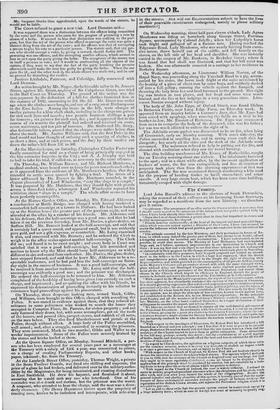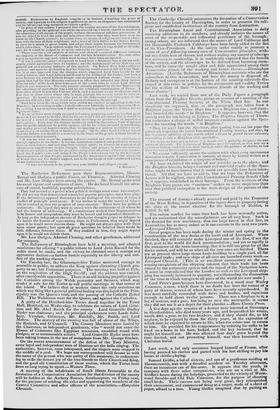Vie Cumin - v.
Lord John Russell's address to the electors of South Devonshire, asking the renewal of their seffrages on his becoming Home Secretary, may be regarded as a manifesto from the new Ministry : we therefore give it entire.
"Gentlemen—The acceptance of an office under the Crown renders it necessary that I should again appeal to the judumeut of the independent and pahhe spirited bully by whom I hare been already three times elected. "Since the last of those elections, a period short in time, but important in events and fruitful in consequences, has elapsed.
" Placed. however undeservedly, at the head of the largest and most powerful Oppo- sition which was ever united againet a Minister of the Crown. I have muleaveured to render the influence which that proud position gave me conducive to the iuterests of the country.
"The attitude assumed by the lute Ministers, and their professions in favour of Re- form, to which many. indeed the greater part of them, had always Nen hostile, offered a tempting occasion for invective and recrimination. I have endeavoured, as far as possible, ro avoid that course. The Mioistry or Lord Melbourne had contemplated large. mud, as I believe, necessary improvements in our institutions in Church and. State ; it was my first and main object to see that these reforms were not eielangered or obstructed in their progress by the change ofeouncils which took place in November. " In conformity with these purposes, Lord Aferpetli proposed and carried an amend- meat to the Address to the Crux n, in which a hope arts expressed, ' that the liberal and comprehensive policy %%Welt restored to the People the right of choosing their Representatives. and which provided fm the emancipation of all persons held in slavery in his Majesty's Colonies and possessiens abroad, %ill, WIth the same enlarged views, place without delay our Municipal Corporations under vigilant popular control, re- move all the well founded grievauces of the Protestant Dissenters, mut correct those abuses in the Church which impair its efficiency icc Eughtud. disturb the peace of society ih Ireland, and lower the character of the Establishment in both countries.' " With respect to the Municipal Corporations, the report of the Commissioners, which. has since appeared, has abundantly confirmed the opinion of the Douse of Commons. It is clearly proved by experieuce, that seff-eleeted corporal ions tend to violet ions of trust. perversions of jestice, the abuse of charitable hinds, political jobbing, and the injury of communities fur w hose benefit they were established. The true remedy for these evils, in my opinion, was to adopt the principle of free election, known to our ancient laws, and established in the Reform Act, to our Municipal Corporations. In this principle Lord Stauley and all the members of Earl Grey's Ministry cordially concurred. The late Ministry, on the other baud, confined theneselves to a vague declaration of their willingness to COUSider the report, and reform abuses. " We hikers ise declared that we desired to remove all the well-fonmled grievances or the l'rotestant Dissenters. In conformity with this decimation, I reed for an address to the Crown, praying for n grant of a chatter to the London Universiiy, winnie the con- scientious Dissenter might obtain the literary honours which at Oxford and Cambridge are exclusively coufiued to those o hu declare themselves members of the Church of England. " With respect to the marriages of Dissenters, Sir Robert Peel has introduced a bill founded on a liberal and just priuciple; but I fear that if it mere to pabh iii its present shape, Protestalit Dissenters would still feel that the line drawn beteseen them and the members of the Church tended to lower them in public estimation. Some alterations in the bill may, perhaps, remedy this defect ; but the establishment of a civil register of births, deaths, and marriages, would afford the best and truest solutionTor all the dif- ficulties of this subject. " lu regard to Church-rates, the agitation on religious subjects, of which these rates are the constant occasion, makes it in everyw ay desirable to abolish an impost whurchi cast once III grievance to I /issetitets. and an injury to the Chtnets With respect to the Church of klogland, Sir Robert Peel did not hesitate clearly to declare his Intention to correct its acknowledged aliases. The opinion which I declared to you in 1832, that the revenues of the Church of England were riot tou large, hut that they ought to be more equitably distributed, seems no hunger to be disputed. The application of this principle mnst be regulated by caution, but not enfeebled by a lurk. log desire to keep alive the seeds of abases a hich we profess to destroy. " With regard to the Church of Ireland, the case is widely different. I refused to assist in making perpetual parochial sinecures where the clergyman and his cleik. ssea4. after week, and y ear after )ear. formed the whole of the congregation. 13,-sides tha general injustice and glaring absurdity of this system, it is easily pawed that the main- tenance of these ecclesiastical sinecures irritates the people of Ireland, weakess the reputation of the British Crowa abroad. and injures the Protestant religion, w'sich it is intended to prosiote. " Let us add to these evils that the present system cannot be maintaiuml except by a large military force ; which in case of fuNign war nimst 01 necessity ter ereetty augo muted. Burdensome to Ragland, rangain •ry in Ireland. d sturbiug the vice of society. mut iltillf101111 to the religiou it professes to serve, no eloquence eau recommend and no talents can long maintain so vicious a policy. "In place of this s stem. I proposed that the surplus revenue of the Establishment, after providing or the spiritual cure of the meadierauf the church, should be devoted to the education of all classes of the people, without dill:int:lien oi reit tiotts persaasion- It was my objeet to teach the ;mot and Milo 0 riuus classes that they have have some his terest in the Church revenue ; to inspire them. by means ot religious an I mar eduea- tion, with the love of their neighbours, and a sense of their duties to the State ; Ii ally. to open their minds to great truths, and soteu their hearts towards the Oovernment which rules them. Then, indeed, might the Pi otestunt Church hope to diff..se its lath, ellee, for it uould be judged by its merits mat not by is exactions.
" Those were the cnier subjects of debate, and often of essential difference between the majority of the House of Commons and the late Adminieqation. On some other topics all agreement app mred, vs hick must to many have been unexpected. " It was Ii constant subject of reproach to Lind they's iuistry, that it dill not suffi- ciently relieve agriculture from its burdens ; and the maintenance of the Malt-tax was pointed out as a glaring instance of this neglect. Sir Robert Peel hehl a different opinion; and upou his declaration that his Ministry mould stand or fall with the Malt- tax. it at once appeared that the clamour which supposed Lord Grey le,stik to the Iambi interest, and Lord Althorp indifferent to tile welfate of the thriller, hail been a mere factious cry, raised without scruple and abandoned without shame. Nor does it appear that had the late Ministry continued in oilier. they intended any thing further than the relief of the land front some part of the eounty.rate, to which Lord A hburp bad last year conient ed. The only measure actually proposed by ths late alinistei s for the advantage of agriculture was a bill ter the voluntary commutation of Tidies. I have aims stated to you that 1(10 not think such a measure would be effectual, and I fear that iu those eases where tithe is most grievous the remedy would be most in- operative. TO frame 0 measure ;dike just to the tithe-owner and tithe payer, is mi. donbtedly dinieult ; but I set, its yet no reason to :ibandou the attempt
Such have been the views which have guided my CO■11■111172 in elipt■Sit iota tn the late Ministry. In sin:seeding to office. I shall endeavour faithfully to carry them into effect. By so doing, I am of opiniou that I shall Le assisting to gather from Lie Reform Act its legitimate ts Mts. "As one ((Ft Los- most deeply engaged ill teaming, proposing. and carrying that great measare, I am Loan Ito declare, tint on the one hand I aid hot inwo that it shuald he the liist of a series of organic changes, each exeeisling its predecessor ill importanee and rapidit y. Even were the changes meditated useful iu themselves. I am of opiniuu that the public nand and the public energies 11 ill be far better (recopied in considering and urgieg practioal improvements. than in squaring our ancient institutions to
st: act t km. y , or suiting them to fureign example. On the other baud, I dhl not intend that the Reform Act should be a mere toy its the hands of the people, without benefit to themselves cr their posterity.
" It was my wish to see the popular in Mimics control and cheek tbe exorbi:aid es corrupt expenses of the State; to see our institutions renewed and purified by elearing them of their defects, and iestoring their original spirit ; to witness the removal of all unnecessary impediments to flee thought. writing, and action to have the interests of all classes neighed. out by the Iwi tiliee ititi III tiii ifl''cti,us of those who counter- feited the People's %Mee, and usurped the Peeple's inheritanee, but by the lei:i.nate Representatives of that People, monomer] by the Sovereign to uphold that monarchy of which they nre the firmest support. dud to be the image of that enlightened oatiou whose confidence they etijoy.
" I have the lemons to be. geutlernen, your faithful and obliged servant, "J. ItussELL."



























 Previous page
Previous page